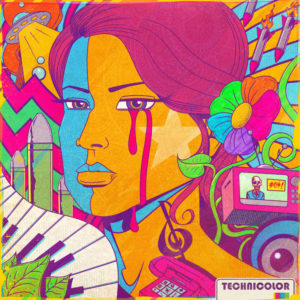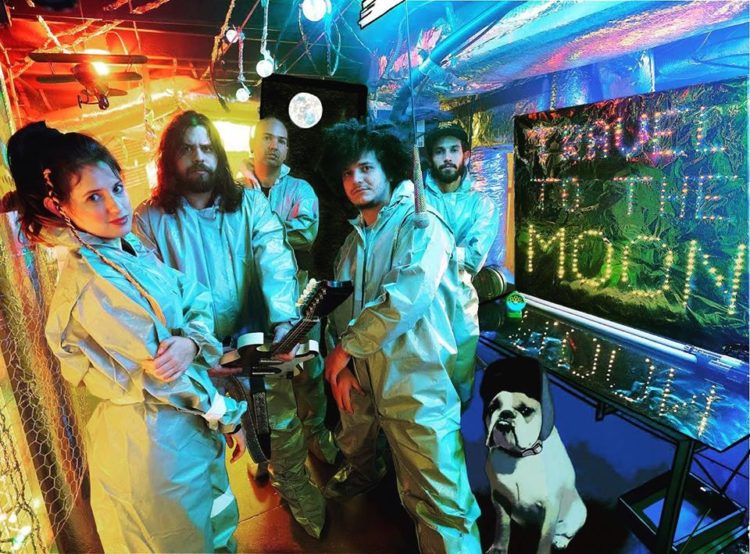
Hailing originally from Havana, Cuba, and now firmly rooted in the verdant and vibrant music city of Nashville, The Sweet Lizzy Project is a band that not only creates irrepressibly upbeat, highly memorable and just plain likeable rock music, the band’s story is one of perseverance, gratitude and exceptional dedication to one’s goals and aspirations.
Fronted by the sensationally charming, eminently talented and delightfully cheerful lead vocalist/songwriter Lisset Diaz, The Sweet Lizzy Project also features her partner/co-writer/bandleader Miguel Comas, keyboardist Wilfredo Gatell, bassist Alejandro Gonzalez, and Angel Luis Millet behind the drum kit.
In February, to great acclaim, The Sweet Lizzy Project released its debut full length album, Technicolor through Mono Mundo/Thirty Tigers. The band has already become a popular draw on the highly competitive Nashville scene, and with the release of the album, is poised for a major breakout in North America and beyond (pending the winding down of the current Covid-19 breakout of course.)
The rarity of a band based in Cuba creating a compelling and evocative version of the all-American genre of rock music is one of the reason why the band relocated to the U.S., as it gave them the chance to hone their craft working alongside some of the top writers, producers, and studios in the world.
It’s taken a while, but within the Nashville scene, the novelty of knowing there is a genuine Cuban band performing – but not performing what most people would consider traditional Cuban music – has seemingly worn off, and now Diaz and her bandmates in The Sweet Lizzy Project are seen as just a kick-ass, exceptionally talented and entertaining band. But it wasn’t always the case.
“When we got here, it’s not like we were the kind of Cuban band that people were expecting. At some places when we got here people would say, ‘oh there’s a Cuban band playing tonight so I am sure it’s going to be salsa or Samba or Rhumba. And then we show up to the gig and it’s completely different. So, I am feeling like I am trying to make other people realize that Cuban music is more than just traditional Cuban music. There’s a lot of different kinds of music that is being created right now in Cuba by young people. There are different movements,” Diaz explained.
“It’s not just about myself, it’s about a lot of other people and musicians who are doing exactly the same thing, they are trying to express themselves in a different way that’s not traditional Cuban music. But that’s Cuban music too. I was born and raised in Cuba, and the experiences I am describing and talking about in my songs are Cuban. It’s my life as a Cuban girl.”
The Sweet Lizzy Project was essentially ‘discovered’ and brought to the U.S. and Nashville in particular by veteran Cuban-American songwriter/musician Raul Malo of the legendary country music act, The Mavericks. He saw them during his involvement in the PBS show Havana Time Machine, and vowed to help the talented quintet to achieve their musical dreams. Mono Mundo is his label, and he also helped the music industry neophytes navigate through the sometimes arcane music industry, leading up to their wonderful debut album.
“Raul and his wife Betty, both of them have been my family for the whole three years or so that we have been here. They have supported us in every way and didn’t expect a penny in return. They trusted us and they believed in our music and it’s meant so much to me, because this is the first time, I am doing this, this is the first time I am trying to make it in the music business. So, I have no idea, really, what I am doing. I have no idea about anything,” she said.
“And it feels great when someone is guiding you through the process and doing it with love. It makes you feel confident, it makes you feel that everything is going to be okay, even when sometimes it’s hard. And it can be especially tough when you’re missing your family and friends, everybody, your country, your home. It’s really hard, and they have been there all the time, fighting for us, fighting with us, both of them. We really appreciate Raul and Betty. We love them so much.

“Raul has been producing the record Technicolor with us. So, he has been a mentor and also he is an incredible human being, but then he is also so talented as a musician that it makes me feel so lucky that he wants to work with me and the band. It’s made being here in Nashville so much easier. We love Nashville, but it’s also good that Raul Malo’s family is mostly Cuban, so that was easier in a lot of ways, including the language issues.”
Technicolor is a rock and roll tour de force, with enough highly attuned melodic elements to make it palatable for even pop audiences, yet there is definitely and insistent, upbeat hard rockin’ attitude underlying every note played and sung. For a first album, it comes across as something put together by more experienced and seasoned players – but then because of all the time The Sweet Lizzy Project spent playing together and rehearsing before they came to the United States, and since arriving, they are very much like a more veteran band. Yet the exuberance and energy of all the songs Technicolor is undeniable, which should come as little surprise after talking to Diaz for any length of time. She is energy and optimism personified – her joy at finally releasing this first album, overflowing.
“We are very, very excited. I have been waiting for this for three years. It’s been a long time. We released the song Technicolor in December and then we released two more songs, Travel to the Moon and Libertad, which means freedom in English. This is just the most amazing time ever, and I am so happy,” she said.
The whole ride over the past three years has been both tumultuous but also enlivening for Diaz and The Sweet Lizzy Project, considering the concept of even being in a band that wrote and played American style rock music was considered to be nigh impossible in the more controlled culture and polity of Cuba’s communist government.
“When we started, and when we first started making music, I don’t think we really thought about what that’s going to mean to other people. When I started doing this, I was studying biochemistry and molecular biology at the University of Havana. I was writing songs, but for myself. I was not expecting others to ever listen to them. But somehow, when you start doing it, and then you put yourself out there, then you notice how whatever you do has an impact on other people. And it doesn’t have to be a huge impact, because the people have an opinion and everybody is actually listening to what you are saying and somehow you can inspire all the people to do different things,” she said.
“In my case it’s been hard, because I come from Cuba and I decided I wanted to sing rock and roll in English, which is a crazy idea, it really is. And to me it didn’t matter, because I didn’t think I was going to make it for real. But then things got complicated because people started asking questions like why are you doing this but lots of other people were like, ‘oh I wish I could do this too; I love this kind of music. I wish I could start a band and do what you are doing.’”
The title track could be perceived as having many meanings, which Diaz is fine with. For her, it’s about her personal journey as a sort of creative outcast in Cuba, to a place where she feels free to compose, record and perform the kind of music that stirs her soul.
“I am talking about me; it is in the first person. I always felt that I didn’t really fit in in Cuba because of the kind of music I was doing, and I always felt different. I wouldn’t say rejected, because we have a lot of followers in Cuba, people we love and miss every single day. But when you are making music in Cuba, you have to go through the government at some point. You have to go through this music institution, and they kind of approve your work. Making music in English and rock and roll is not exactly what they are expecting so it’s not the easiest way to become a musician in Cuba,” she said.

“I always felt like I was not in the right place. So that’s pretty much what the song is about, is that there are all kinds of colours and bright shades out there, and I feel that I am still in a black and white world. I can’t understand what I am seeing, and I can’t seem to fit in. But it’s also about all the technology that’s out there, especially here in America, which we didn’t really have any of that in Cuba. You couldn’t even get new musical instruments and it was hard to even get guitar strings or drumsticks.
“We were thinking about that contrast when we wrote the song, and how you kind of miss technology when you are in Cuba. Although when you are here, technology kind of creates this illusion of progress, but then people don’t talk to each other. And they don’t share a nice conversation just because they are so distracted by all the colours and all the new things that are coming all the time, stealing your attention. So, it’s about that too.”
The Flower’s In the Seed was a collaboration between The Sweet Lizzy Project and the Mavericks and was one of the first songs completed for the album.
“When we first got here, Raul was like, ‘hey guys, this song has been on my computer for years and no one has ever recorded it.’ And he was kind of skeptical and thought it was not the kind of music we did, but we loved the song. When we listened to it for the first time it was like, ‘this is a great song’. So, we did our version of the song, and Raul loved it and the rest of the Mavericks fell in love with it too. We thought, because of the message of the song, that it would be a good idea to do it together,” said Diaz.
“And that was very special because that was the first time we recorded at Blackbird Studios, which for the Mavericks, is what they do all the time. But for us, we’ve only recorded in Havana in really little apartment studios with old equipment. We went from there to Blackbird Studios and it was like, ‘hello, this is quite a step up.’”
One track that epitomizes the hopefulness and upbeat nature not only of The Sweet Lizzy Project’s music, but of Lisset Diaz herself, is the lovely Travel to the Moon.
“The video kind of describes the song pretty well for those who have seen it. It’s pretty much about a video game where kids are playing it and it’s the dream about that we wish people were more interested in travelling to the moon or doing important things, things that matter to all of humanity, than to just be making wars and doing bad things too other people. So, Travel to the Moon is our metaphor for peace and love,” she said.
“And the video is about that too – about dreaming big. And that we need to explore the full potential of humanity for things that actually matter. It’s actually a really old song for us, it was written a while ago and has a bunch of people contributing to it, which is nice. I remember it was fun writing and creating that song because there were a lot of people in the studio just throwing around all these great ideas.”
An exceptionally moving, touching and heartfelt song, December 31 is the 10th and final song on Technicolor.
“That one is such a personal song. Miguel is not only my partner in the band, he is my partner in life. We are actually engaged, which happened just a couple of months ago, which was very special. At this particular time [she wrote the song], we had broken up and it was a very sad period for me. So, a former band member and I, we wrote that song, and it was a very sad night, as just the two of us sat there writing this song.,” she explained.
“It’s about me being sad because I was not with Miguel anymore and it was New Year’s Eve. So, everybody else was celebrating and I was there being sad and not celebrating. This actually happened a long time ago. And the thing that is really funny is that in Cuba, getting married is not a big deal. People spend their lives together and they don’t get married because it’s not a big deal. Here in the U.S. there are a lot of different implications when you get married, so it’s important. We were celebrating seven years together and we were playing this venue here in Nashville that I love called Bourbon Street, and I was so happy because we were celebrating the seventh anniversary of Miguel being my boyfriend.
“And I said that to the audience and people seemed stunned. ‘You’ve been together for seven years and you’re not married?’ We played there for four hours, which is a really long night, and you know as people get more and more drunk, they feel more comfortable treating you like you’re friends or family. So, by the middle of the night ladies were hugging me and some were taking me into the bathroom and saying, ‘he is taking advantage of you. You should do something about it. It’s been seven years; you should go and get yourself another man who is going to marry you.’ It was so funny, and I tried to explain that marriage wasn’t a big deal in Cuba. People were literally hating on him and it was so funny. They were saying ‘you’d better put a ring on it dude.’ Obviously, he loves me, and I love him, it’s just that we never thought of it. But by the second half of the night he was like, ‘you’re right’ and he asked me to marry him. I have to say that it was very romantic, the moment was very special.”
What is also very special is the chance to see The Sweet Lizzy Project perform live. Obviously due to the current issues surrounding the Covid-19 pandemic, touring is impossible, but you can still find our more information about the Technicolor album, watch some videos and learn more about the band at https://www.sweetlizzyproject.com, or on their various social media accounts.
- Jim Barber is a veteran award-winning journalist and author based in Napanee, ON, who has been writing about music and musicians for 30 years. Besides his journalistic endeavours, he now works as a communications and marketing specialist. Contact him at jimbarberwritingservices@gmail.com.
SHARE THIS POST:
